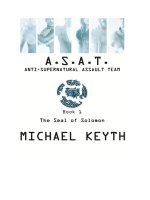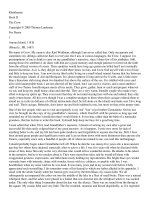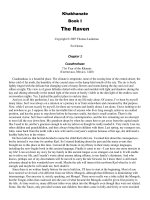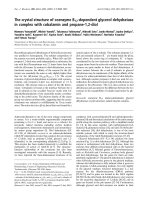Book 1 the crystal shard
Bạn đang xem bản rút gọn của tài liệu. Xem và tải ngay bản đầy đủ của tài liệu tại đây (1.78 MB, 298 trang )
BLOOD MELTS
THE ARCTIC SNOW
Wulfgar was heavily engaged with the remaining giant, easily maneuvering Aegis-fang to
deflect the monster’s powerful blows, but he was able to catch glimpses of the battle to his side.
The scene painted a grim reminder of the value of what Drizzt had taught him, for the drow was
toying with the verbeeg, using its uncontrolled rage against it. Again and again, the monster
reared for a killing blow, and each time Drizzt was quick to strike and dance away. Verbeeg
blood flowed freely from a dozen wounds, and Wulfgar knew that Drizzt could finish the job at
any time.
But he was amazed that the dark elf was enjoying the tormenting game he played.
THE LEGEND OF DRIZZT
Homeland
Exile
Sojourn
The Crystal Shard
Streams of Silver
The Halfling’s Gem
The Legacy
Starless Night
Siege of Darkness
Passage to Dawn
The Silent Blade
The Spine of the World
Sea of Swords
THE HUNTER’S BLADES TRILOGY
The Thousand Orcs
The Lone Drow
The Two Swords
THE SELLSWORDS
Servant of the Shard
Promise of the Witch-King
Road of the Patriarch
TO MY WIFE, DIANE
AND TO BRYAN, GENO, AND CAITLIN
FOR THEIR SUPPORT AND PATIENCE
.
THROUGH THIS EXPERIENCE
,
AND TO MY PARENTS, GENO AND IRENE
.
FOR BELIEVING IN ME EVEN WHEN I DIDN’T
Whenever an author takes on a project like this, especially if it is his first novel, there are
invariably a number of people who help him accomplish the task. The writing of The Crystal
Shard was no exception.
Publishing a novel involves three elements: a degree of talent; a lot of hard work; and a good
measure of luck. The first two elements can be controlled by the author, but the third involves
being in the right place at the right time and finding an editor who believes in your ability and
dedication to the task at hand.
Therefore, my greatest thanks go to TSR, and especially to Mary Kirchoff, for taking a
chance on a first time author and guiding me throughout the process.
Writing in the 1980s has become a high-tech chore as well as an exercise in creativity. In the
case of The Crystal Shard, luck once again worked on my side. I consider myself lucky to have a
friend like Brian P. Savoy, who loaned me his software expertise in smoothing out the rough
edges.
My thanks also to my personal opinion-givers, Dave Duquette and Michael LaVigueur, for
pointing out strengths and weaknesses in the rough draft, to my brother, Gary Salvatore, for his
work on the maps of Icewind Dale, and to the rest of my AD&D® game group, Tom Parker,
Daniel Mallard, and Roland Lortie, for their continued inspiration through the development of
eccentric characters fit to wear the mantle of a hero in a fantasy novel.
And finally; to the man who truly brought me into the world of the AD&D game, Bob
Brown. Since you moved away (and took the pipe smoke with you) the atmosphere around the
gaming table just hasn’t been the same.
—R.A. Salvatore, 1988
PRELUDE
he demon sat back on the seat it had carved in the stem of the giant mushroom. Sludge slurped
and rolled around the rock island, the eternal oozing and shifting that marked this layer of the
Abyss.
Errtu drummed its clawed fingers, its horned, apelike head lolling about on its shoulders as it
peered into the gloom. “Where are you, Telshazz?” the demon hissed, expecting news of the
relic. Crenshinibon pervaded all of the demon’s thoughts. With the shard in its grasp, Errtu could
rise over an entire layer, maybe even several layers.
And Errtu had come so close to possessing it!
The demon knew the power of the artifact; Errtu had been serving seven lichs when they
combined their evil magics and made the Crystal Shard. The lichs, undead spirits of powerful
wizards that refused to rest when their mortal bodies had passed from the realms of the living,
had gathered to create the most vile artifact ever made, an evil that fed and flourished off of that
which the purveyors of good considered most precious—the light of the sun.
But they had gone beyond even their own considerable powers. The forging actually
consumed the seven, Crenshinibon stealing the magical strength that preserved the lichs’ undead
state to fuel its own first flickers of life. The ensuing bursts of power had hurtled Errtu back to
the Abyss, and the demon had presumed the shard destroyed.
But Crenshinibon would not be so easily destroyed. Now, centuries later, Errtu had stumbled
upon the trail of the Crystal Shard again; a crystal tower, Cryshal-Tirith, with a pulsating heart
the exact image of Crenshinibon.
Errtu knew the magic was close by; the demon could sense the powerful presence of the relic.
If only it could have found the thing earlier…if only it could have grasped….
But then Al Dimeneira had arrived, an angelic being of tremendous power. Al Dimeneira
banished Errtu back to the Abyss with a single word.
Errtu peered through the swirling smoke and gloom when it heard the sucking footsteps.
“Telshazz?” the demon bellowed.
“Yes, my master,” the smaller demon answered, cowering as it approached the mushroom
throne.
“Did he get it?” Errtu roared. “Does Al Dimeneira have the Crystal Shard?”
Telshazz quivered and whimpered, “Yes, my lord…uh, no, my lord!”
Errtu’s evil red eyes narrowed.
“He could not destroy it,” the little demon was quick to explain. “Crenshinibon burned his
hands!”
“Hah!” Errtu snorted. “Beyond even the power of Al Dimeneira! Where is it, then? Did you
bring it, or does it remain in the second crystal tower?”
Telshazz whimpered again. It didn’t want to tell its cruel master the truth, but it would not
dare to disobey. “No, master, not in the tower,” the little demon whispered.
“No!” Errtu roared. “Where is it?”
“Al Dimeneira threw it.”
“Threw it?”
“Across the planes, merciful master!” Telshazz cried. “With all of his strength!”
“Across the very planes of existence !” Errtu growled.
“I tried to stop him, but …”
The horned head shot forward. Telshazz’s words gurgled indecipherably as Errtu’s canine
maw tore its throat out.
Far removed from the gloom of the Abyss, Crenshinibon came to rest upon the world. Far up
in the northern mountains of Faerûn the Crystal Shard, the ultimate perversion, settled into the
snow of a bowl-shaped dell.
And waited.
f I could choose what life would be mine, it would be this life that I now
have, at this time. I am at peace, and yet, the world around me swirls
with turmoil, with the ever-present threat of barbarian raids and goblin
wars, with tundra yetis and gigantic polar worms. The reality of
existence here in Icewind Dale is harsh indeed, an environment
unforgiving, where one mistake will cost you your life.
That is the joy of the place, the very edge of disaster, and not because
of treachery, as I knew in my home of Menzoberranzan. I can accept the
risks of Icewind Dale; I can revel in them and use them to keep my
warrior instincts finely honed. I can use them to remind me every day of
the glory and joy of life. There is no complacency here, in this place
where safety cannot be taken for granted, where a turn of the wind can
pile snow over your head, where a single misstep on a boat can put you
into water that will steal your breath away and render muscles useless in
mere seconds, or a simple lapse on the tundra can put you in the belly of
a fierce yeti.
When you live with death so close, you come to appreciate life all the
more.
And when you share that life with friends like those that I have come
to know these last years, then you know paradise. Never could I have
imagined in my years in Menzoberranzan, or in the wilds of the
Underdark, or even when I first came to the surface world, that I would
ever surround myself with such friends as these. They are of different
races, all three, and all three different from my own, and yet, they are
more alike what is in my heart than anyone I have ever known, save,
perhaps, my father Zaknafein and the ranger, Montolio, who trained me
in the ways of Mielikki.
I have met many folk up here in Ten-Towns, in the savage land of
Icewind Dale, who accept me despite my dark elf heritage, and yet, these
three, above all others, have become as family to me.
Why them? Why Bruenor, Regis, and Catti-brie above all others,
three friends whom I treasure as much as Guenhwyvar, my companion
for all these years?
Everyone knows Bruenor as blunt—that is the trademark of many
dwarves, but in Bruenor, the trait runs pure. Or so he wants all to
believe. I know better. I know the other side of Bruenor, the hidden side,
that soft and warm place. Yes, he has a heart, though he tries hard to
bury it! He is blunt, yes, particularly with criticism. He speaks of errors
without apology and without judgment, simply telling the honest truth
and leaving it up to the offender to correct, or not correct the situation.
Bruenor never allows tact or empathy to get in the way of his telling the
world how it can be better!
But that is only half of the tale concerning the dwarf, on the other side
of the coin, he is far from blunt. Concerning compliments, Bruenor is not
dishonest, just quiet.
Perhaps that is why I love him. I see in him Icewind Dale itself, cold
and harsh and unforgiving, but ultimately honest. He keeps me at my
best, all the time, and in doing that, he helps me to survive in this place.
There is only one Icewind Dale, and only one Bruenor Battlehammer,
and if ever I met a creature and a land created for each other …
Conversely, Regis stands (or more appropriately, reclines), as a
reminder to me of the goals and rewards of a job well done—not that
Regis is ever the one who does that job. Regis reminds me, and Bruenor,
I would guess, that there is more to life than responsibility, that there are
times for personal relaxation and enjoyment of the rewards brought
about by good work and vigilance. He is too soft for the tundra, too
round in the belly and too slow on his feet. His fighting skills are lacking
and he could not track a herd of caribou on fresh snow. Yet he survives,
even thrives up here with wit and attitude, with an understanding, better
than Bruenor’s surely, and even better than my own, of how to appease
and please those around him, of how to anticipate, rather than just react
to the moves of others. Regis knows more than just what people do, he
knows why they do it, and that ability to understand motivation allowed
him to see past the color of my skin and the reputation of my people. If
Bruenor is honest in expressing his observations, then Regis is honest in
following the course of his heart.
And finally there is Catti-brie, wonderful and so full of life. Catti-brie
is the opposite side of the same coin to me, a different reasoning to reach
the same conclusions. We are soulmates who see and judge different
things in the world to arrive at the same place. Perhaps we thus validate
each other. Perhaps in seeing Catti-brie arriving at the same place as
myself, and knowing that she arrived there along a different road, tells
me that I followed my heart truly. Is that it? Do I trust her more than I
trust myself?
That question is neither indictment of my feelings, nor any selfincrimination. We share beliefs about the way of the world and the way
the world should be. She is akin to my heart as is Mielikki, and if I found
my goddess by looking honestly into my own heart, then so I have found
my dearest friend and ally.
They are with me, all three, and Guenhwyvar, dear Guenhwyvar, as
well. I am living in a land of stark beauty and stark reality, a place where
you have to be wary and alert and at your very best at all times.
I call this paradise.
—Drizzt Do’Urden
hen the wizards’ caravan from the Hosttower of the Arcane saw the snowcapped peak of Kelvin’s Cairn rising from the flat horizon, they were more
than a little relieved. The hard journey from Luskan to the remote frontier
settlement known as Ten-Towns had taken them more than three tendays.
The first tenday hadn’t been too difficult. The troop held close to the
Sword Coast, and though they were traveling along the northernmost reaches
of the Realms, the summer breezes blowing in off the Trackless Sea were
comfortable enough.
But when they rounded the westernmost spurs of the Spine of the World,
the mountain range that many considered the northern boundary of
civilization, and turned into Icewind Dale, the wizards quickly understood
why they had been advised against making this journey. Icewind Dale, a
thousand square miles of barren, broken tundra, had been described to them
as one of the most unwelcoming lands in all the Realms, and within a single
day of traveling on the northern side of the Spine of the World, Eldeluc,
Dendybar the Mottled, and the other wizards from Luskan considered the
reputation well-earned. Bordered by impassable mountains on the south, an
expanding glacier on the east, and an unnavigable sea of countless icebergs
on the north and west, Icewind Dale was attainable only through the pass
between the Spine of the World and the coast, a trail rarely used by any but
the most hardy of merchants.
For the rest of their lives, two memories would ring clear in the wizards’
minds whenever they thought about this trip, two facts of life on Icewind
Dale that travelers here never forgot. The first was the endless moaning of the
wind, as though the land itself was continuously groaning in torment. And the
second was the emptiness of the dale, mile after mile of gray and brown
horizon lines.
The caravan’s destination marked the only varying features in all the dale
—ten small towns positioned around the three lakes of the region, under the
shadow of the only mountain, Kelvin’s Cairn. Like everyone else who came
to this harsh land the wizards sought Ten-Towns’ scrimshaw, the fine ivory
carvings made from the headbones of the knucklehead trout which swam in
the waters of the lakes.
Some of the wizards, though, had even more devious gains in mind.
The man marveled at how easily the slender dagger slipped through the
folds in the older man’s robe and then cut deeper into the wrinkled flesh.
Morkai the Red turned on his apprentice, his eyes locked into a widened,
amazed set at the betrayal by the man he had raised as his own son for a
quarter of a century.
Akar Kessell let go of the dagger and backed away from his master,
horrified that the mortally wounded man was still standing. He ran out of
distance for his retreat, stumbling into the rear wall of the small cabin the
wizards of Luskan had been given as temporary quarters by the host city of
Easthaven. Kessell trembled visibly, pondering the grisly consequences he
would face in light of the growing possibility that the magical expertise of the
old mage had found a way to defeat even death itself.
What terrible fate would his mighty mentor impose upon him for his
betrayal? What magical torments could a true and powerful wizard such as
Morkai conjure that would outdo the most agonizing of the tortures common
throughout the land?
The old man held his gaze firmly on Akar Kessell, even as the last light
began to fade from his dying eyes. He didn’t ask why, he didn’t even
outwardly question Kessell about the possible motives. The gain of power
was involved somewhere, he knew—that was always the case in such
betrayals. What confused him was the instrument, not the motive. Kessell?
How could Kessell, the bumbling apprentice whose stuttering lips could
barely call out the simplest of cantrips, possibly hope to profit from the death
of the only man who had ever shown him more than basic, polite
consideration?
Morkai the Red fell dead. It was one of the few questions he had never
found the answer to.
Kessell remained against the wall, needing its tangible support, and
continued to shake for long minutes. Gradually, the confidence that had put
him in this dangerous position began to grow again within him. He was the
boss now—Eldeluc, Dendybar the Mottled, and the other wizards who had
made the trip had said so. With his master gone, he, Akar Kessell, would be
rightfully awarded his own meditation chamber and alchemy lab in the
Hosttower of the Arcane in Luskan.
Eldeluc, Dendybar the Mottled, and the others had said so.
“It is done, then?” the burly man asked when Kessell entered the dark alley
designated as the meeting place.
Kessell nodded eagerly. “The red-robed wizard of Luskan shan’t cast
again!” he proclaimed too loudly for the likes of his fellow conspirators.
“Speak quietly, fool,” Dendybar the Mottled, a frail-looking man tucked
defensively within the alleyway’s shadows, demanded in the same
monotonous voice that he always used. Dendybar rarely spoke at all and
never displayed any semblance of passion when he did. Ever was he hidden
beneath the low-pulled cowl of his robe. There was something cold-blooded
about Dendybar that unnerved most people who met him. Though the wizard
was physically the smallest and least imposing man on the merchant caravan
that had made the four-hundred mile journey to the frontier settlement of
Ten-Towns, Kessell feared him more than any of the others.
“Morkai the Red, my former master, is dead,” Kessell reiterated softly.
“Akar Kessell, this day forward known as Kessell the Red, is now
appointed to the Wizard’s Guild of Luskar!”
“Easy, friend,” said Eldeluc, putting a comforting hand on Kessell’s
nervously twitching shoulder. “There will be time for a proper coronation
when we return to the city.” He smiled and winked at Dendybar from behind
Kessell’s head.
Kessell’s mind was whirling, lost in a daydream search through all of the
ramifications of his pending appointment. Never again would he be taunted
by the other apprentices, boys much younger than he who climbed through
the ranks in the guild step by tedious step. They would show him some
respect now, for he would leap beyond even those who had passed him by in
the earliest days of his apprenticeship, into the honorable position of wizard.
As his thoughts probed every detail of the coming days, though, Kessell’s
radiant face suddenly grayed over. He turned sharply on the man at his side,
his features tensed as though he had discovered a terrible error. Eldeluc and
several of the others in the alley became uneasy. They all fully understood
the consequences if the archmage of the Hosttower of the Arcane ever
learned of their murderous deed.
“The robe?” Kessell asked. “Should I have brought the red robe?”
Eldeluc couldn’t contain his relieved chuckle, but Kessell merely took it as
a comforting gesture from his new-found friend.
I should have known that something so trivial would throw him into such a
fit, Eldeluc told himself, but to Kessell he merely said, “Have no fear about it.
There are plenty of robes in the Hosttower. It would seem a bit suspicious,
would it not, if you showed up at the archmage’s doorstep claiming the
vacated seat of Morkai the Red and holding the very garment that the
murdered wizard was wearing when he was slain?”
Kessell thought about it for a moment, then agreed.
“Perhaps,” Eldeluc continued, “you should not wear the red robe.”
Kessell’s eyes squinted in panic. His old self-doubts, which had haunted
him for all of his days since his childhood, began to bubble up within him.
What was Eldeluc saying? Were they going to change their minds and not
award him the seat he had rightfully earned?
Eldeluc had used the ambiguity of his statement as a tease, but he didn’t
want to push Kessell into a dangerous state of doubt. With a second wink at
Dendybar, who was inwardly thoroughly enjoying this game, he answered
the poor wretch’s unspoken question. “I only meant that perhaps a different
color would better suit you. Blue would compliment your eyes.”
Kessell cackled in relief. “Perhaps,” he agreed, his fingers nervously
twiddling.
Dendybar suddenly grew tired of the farce. He motioned for his burly
companion to be rid of the annoying little wretch.
Eldeluc obediently led Kessell back down the alleyway. “Go on, now, back
to the stables,” he instructed. “Tell the master there that the wizards shall be
leaving for Luskan this very night.”
“But what of the body?” Kessell asked.
Eldeluc smiled evilly. “Leave it. That cabin is reserved for visiting
merchants and dignitaries from the south. It will most probably remain vacant
until next spring. Another murder in this part of the world will cause little
excitement, I assure you, and even if the good people of Easthaven were to
decipher what had truly happened, they are wise enough to tend to their own
business and leave the affairs of wizards to wizards!”
The group from Luskan moved out into the waning sunlight on the street.
“Now be off!” Eldeluc commanded. “Look for us as the sun sets.” He
watched as Kessell, like some elated little boy, scurried away.
“How fortunate to find so convenient a tool,” Dendybar noted. “The
wizard’s stupid apprentice saved us much trouble. I doubt that we would have
found a way to get at that crafty old one. Though the gods alone know why,
ever did Morkai have a soft spot for his wretched little apprentice!”
“Soft enough for a dagger’s point!” laughed a second voice.
“And so convenient a setting,” remarked yet another. “Unexplained bodies
are considered no more than an inconvenience to the cleaning wenches in this
uncivilized outpost.”
The burly Eldeluc laughed aloud. The gruesome task was at last
completed; they could, finally, leave this barren stretch of frozen desert and
return home.
Kessell’s step was sprightly as he made his way across the village of
Easthaven to the barn where the wizards’ horses had been stabled. He felt as
though becoming a wizard would change every aspect of his daily life, as if
some mystical strength had somehow been infused into his previously
incompetent talents.
He tingled in anticipation of the power that would be his. An alley-cat
crossed before him, casting him a wary glance as it pranced by.
Slit-eyed, Kessell looked around to see if anyone was watching. “Why
not?” he muttered. Pointing a deadly finger at the cat, he uttered the
command words to call forth a burst of energy. The nervous feline bolted
away at the spectacle, but no magical bolts struck it, or even near it.
Kessell looked down at his singed fingertip and wondered what he had
done wrong.
But he wasn’t overly dismayed. His own blackened nail was the strongest
effect he had ever gotten from that particular spell.
egis the halfling, the only one of his kind for hundreds of miles in any
direction, locked his fingers behind his head and leaned back against the
mossy blanket of the tree trunk. Regis was short, even by the standards of his
diminutive race, with the fluff of his curly brown locks barely cresting the
three-foot mark, but his belly was amply thickened by his love of a good
meal, or several, as the opportunities presented themselves.
The crooked stick that served as his fishing pole rose up above him,
clenched between two of his furry toes, and hung out over the quiet lake,
mirrored perfectly in the glassy surface of Maer Dualdon. Gentle ripples
rolled down the image as the red-painted wooden bobber began to dance
slightly. The line had floated in toward shore and hung limply in the water, so
Regis couldn’t feel the fish nibbling at the bait. In seconds, the hook was
cleaned with no catch to show for it, but the halfling didn’t know, and it
would be hours before he’d even bother to check. Not that he’d have cared,
anyway.
This trip was for leisure, not work. With winter coming on, Regis figured
that this might well be his last excursion of the year to the lake; he didn’t go
in for winter fishing, like some of the fanatically greedy humans of TenTowns. Besides, the halfling already had enough ivory stocked up from other
people’s catches to keep him busy for all seven months of snow. He was truly
a credit to his less-than-ambitious race, carving out a bit of civilization in a
land where none existed, hundreds of miles from the most remote settlement
that could rightly be called a city. Other halflings never came this far north,
even during the summer months, preferring the comfort of the southern
climes. Regis, too, would have gladly packed up his belongings and returned
to the south, except for a little problem he had with a certain guildmaster of a
prominent thieves’ guild.
A four-inch block of the “white gold” lay beside the reclining halfling,
along with several delicate carving instruments. The beginnings of a horse’s
muzzle marred the squareness of the block. Regis had meant to work on the
piece while he was fishing.
Regis meant to do a lot of things.
“Too fine a day,” he had rationalized, an excuse that never seemed to grow
stale for him. This time, though, unlike so many others, it truly bore
credibility. It seemed as though the weather demons that bent this harsh land
to their iron will had taken a holiday, or perhaps they were just gathering
their strength for a brutal winter. The result was an autumn day fitting for the
civilized lands to the south. A rare day indeed for the land that had come to
be called Icewind Dale, a name well-earned by the eastern breezes that
always seemed to blow in, bringing with them the chilled air of Reghed
Glacier. Even on the few days that the wind shifted there was little relief, for
Ten-Towns was bordered on the north and west by miles of empty tundra and
then more ice, the Sea of Moving Ice. Only southern breezes promised any
relief, and any wind that tried to reach this desolate area from that direction
was usually blocked by the high peaks of the Spine of the World.
Regis managed to keep his eyes open for a while, peering up through the
fuzzy limbs of the fir trees at the puffy white clouds as they sailed across the
sky on the mild breezes. The sun rained down golden warmth, and the
halfling was tempted now and then to take off his waistcoat. Whenever a
cloud blocked out the warming rays, though, Regis was reminded that it was
Eleint on the tundra. In a month there would be snow. In two, the roads west
and south to Luskan, the nearest city to Ten-Towns, would be impassable to
any but the sturdy or the stupid.
Regis looked across the long bay that rolled in around the side of his little
fishing hole. The rest of Ten-Towns was taking advantage of the weather,
too; the fishing boats were out in force, scrambling and weaving around each
other to find their special “hitting spots.” No matter how many times he
witnessed it, the greed of humans always amazed Regis. Back in the southern
land of Calimshan, the halfling had been climbing a fast ladder to Associate
Guildmaster in one of the most prominent thieves’ guilds in the port city of
Calimport. But as he saw it, human greed had cut short his career. His
guildmaster, the Pasha Pook, possessed a wonderful collection of rubies—a
dozen, at least—whose facets were so ingeniously cut that they seemed to
cast an almost hypnotic spell on anyone who viewed them. Regis had
marveled at the scintillating stones whenever Pook put them out on display,
and after all, he’d only taken one. To this day, the halfling couldn’t figure out
why the Pasha, who had no less than eleven others, was still so angry with
him.
“Alas for the greed of humans,” Regis would say whenever the Pasha’s
men showed up in another town that the halfling had made his home, forcing
him to extend his exile to an even more remote land. But he hadn’t needed
that phrase for a year-and-a-half now, not since he had arrived in Ten-Towns.
Pook’s arms were long, but this frontier settlement, in the middle of the most
inhospitable and untamed land imaginable, was a longer way still, and Regis
was quite content in the security of his new sanctuary. There was wealth here,
and for those nimble and talented enough to be a scrimshander, someone who
could transform the ivorylike bone of a knucklehead trout into an artistic
carving, a comfortable living could be made with a minimum amount of
work.
And with Ten-Towns’ scrimshaw fast becoming the rave of the south, the
halfling meant to shake off his customary lethargy and turn his new-found
trade into a booming business.
Someday.
Drizzt Do’Urden trotted along silently, his soft, low-cut boots barely
stirring the dust. He kept the cowl of his brown cloak pulled low over the
flowing waves of his stark white hair and moved with such effortless grace
that an onlooker might have thought him to be no more than an illusion, an
optical trick of the brown sea of tundra.
The dark elf pulled his cloak tighter about him. He felt as vulnerable in the
sunlight as a human would in the dark of night. More than half a century of
living many miles below ground had not been erased by several years on the
sunlit surface. To this day, sunlight drained and dizzied him.
But Drizzt had traveled right through the night and was compelled to
continue. Already he was overdue for his meeting with Bruenor in the
dwarf’s valley, and he had seen the signs.
The reindeer had begun their autumn migration southwest to the sea, yet no
human track followed the herd. The caves north of Ten-Towns, always a
stopover for the nomadic barbarians on their way back to the tundra, had not
even been stocked to re-provision the tribes on their long trek. Drizzt
understood the implications. In normal barbarian life, the survival of the
tribes depended on their following the reindeer herd. The apparent
abandonment of their traditional ways was more than a little disturbing.
And Drizzt had heard the battle drums.
Their subtle rumblings rolled over the empty plain like distant thunder, in
patterns usually recognizable only to the other barbarian tribes. But Drizzt
knew what they foretold. He was an observer who understood the value of
knowledge of friend or foe, and he had often used his stealth prowess to
observe the daily routines and traditions of the proud natives of Icewind Dale,
the barbarians.
Drizzt picked up his pace, pushing himself to the limits of his endurance.
In five short years, he had come to care for the cluster of villages known as
Ten-Towns and for the people who lived there. Like so many of the other
outcasts who had finally settled there, the drow had found no welcome
anywhere else in the Realms. Even here he was only tolerated by most, but in
the unspoken kinship of fellow rogues, few people bothered him. He’d been
luckier than most; he’d found a few friends who could look beyond his
heritage and see his true character.
Anxiously, the dark elf squinted at Kelvin’s Cairn, the solitary mountain
that marked the entrance to the rocky dwarven valley between Maer Dualdon
and Lac Dinneshere, but his violet-colored almond eyes, marvelous orbs that
could rival an owl’s in the night, could not penetrate the blur of daylight
enough to gauge the distance.
Again he ducked his head under the cowl, preferring a blind run to the
dizziness of prolonged exposure to the sun, and sank back into the dark
dreams of Menzoberranzan, the lightless underworld city of his ancestors.
The drow elves had actually once walked on the surface world, dancing
beneath the sun and the stars with their fair-skinned cousins. Yet the dark
elves were malicious, passionless killers beyond the tolerance of even their
normally unjudging kin. And in the inevitable war of the elven nations, the
drow were driven into the bowels of the ground. Here they found a world of
dark secrets and dark magics and were content to remain. Over the centuries,
they had flourished and grown strong once more, attuning themselves to the
ways of mysterious magics. They became more powerful than even their
surface-dwelling cousins, whose dealings with the arcane arts under the lifegiving warmth of the sun were hobby, not necessity.
As a race, though, the drow had lost all desire to see the sun and the stars.
Both their bodies and minds had adapted to the depths, and luckily for all
who dwelt under the open sky, the evil dark elves were content to remain
where they were, only occasionally resurfacing to raid and pillage. As far as
Drizzt knew, he was the only one of his kind living on the surface. He had
learned some tolerance of the light, but he still suffered the hereditary
weaknesses it imparted upon his kind.
Yet even considering his disadvantage under daytime conditions, Drizzt
was outraged by his own carelessness when the two bearlike tundra yetis,
their camouflaging coats of shaggy fur still colored in summer brown,
suddenly rose up before him.
A red flag rose from the deck of one of the fishing boats, signaling a catch.
Regis watched as it moved higher and higher. “A four-footer, or better,” the
halfling mumbled approvingly when the flag topped out just below the mast’s
crosspiece. “There’ll be singing in one house tonight!”
A second ship raced up beside the one that had signaled the catch, banging
into the anchored vessel in its rush. The two crews immediately drew
weapons and faced off, though each remained on its respective ship. With
nothing between him and the boats but empty water, Regis clearly heard the
shouts of the captains.
“Ere, ye stole me catch!” the captain of the second ship roared.
“You’re water-weary!” the captain of the first ship retorted. “Never it was!
It’s our fish fairly hooked and fairly hauled! Now be gone with your stinking
tub before we take you out of the water!”
Predictably, the crew of the second ship was over the rail and swinging
before the captain of the first ship had finished speaking.
Regis turned his eyes back to the clouds; the dispute on the boats did not
hold any interest for him, though the noises of the battle were certainly
disturbing. Such squabbles were common on the lakes, always over the fish,
especially if someone landed a big one. Generally they weren’t too serious,
more bluster and parrying than actual fighting, and only rarely did someone
get badly wounded or killed. There were exceptions, though. In one skirmish
involving no less than seventeen boats, three full crews and half of a fourth
were cut down and left floating in the bloodied water. On that same day, that
particular lake, the southernmost of the three, had its name changed from
Dellon-lune to Redwaters.
“Ah little fishes, what trouble you bring,” Regis muttered softly, pondering
the irony of the havoc the silvery fish wreaked on the lives of the greedy
people of Ten-Towns. These ten communities owed their very existence to
the knucklehead trout, with their oversized, fist-shaped heads and bones the
consistency of fine ivory. The three lakes were the only spots in the world
where the valuable fish were known to swim, and though the region was
barren and wild, overrun with humanoids and barbarians and sporting
frequent storms that could flatten the sturdiest of buildings, the lure of quick
wealth brought in people from the farthest reaches of the Realms.
As many inevitably left as came in, though. Icewind Dale was a bleak,
colorless wasteland of merciless weather and countless dangers. Death was a
common visitor to the villagers, stalking any who could not face the harsh
realities of Icewind Dale.
Still, the towns had grown considerably in the century that had passed
since the knuckleheads were first discovered. Initially, the nine villages on
the lakes were no more than the shanties where individual frontiersmen had
staked out a claim on a particularly good fishing hole. The tenth village, Bryn
Shander, though now a walled, bustling settlement of several thousand
people, had been merely an empty hill sporting a solitary cabin where the
fishermen would meet once a year, exchanging stories and goods with the
traders from Luskan.
Back in the early days of Ten-Towns a boat, even a one-man row-boat, out
on the lakes, whose waters year-round were cold enough to kill in minutes
anyone unfortunate enough to fall overboard, was a rare sight, but now every
town on the lakes had a fleet of sailing vessels flying its flag. Targos alone,
largest of the fishing towns, could put over a hundred vessels onto Maer
Dualdon, some of them twomasted schooners with crews of ten or more.
A death cry sounded from the embattled ships, and the clang of steel on
steel rang out loudly. Regis wondered, and not for the first time, if the people
of Ten-Towns would be better off without the troublesome fish.
The halfling had to admit that Ten-Towns had been a haven for him,
though. His practiced, nimble fingers adapted easily to the instruments of the
scrimshander, and he had even been elected as the council spokesman of one
of the villages. Granted, Lonelywood was the smallest and northernmost of
the ten towns, a place where the rogues of rogues hid out, but Regis still
considered his appointment an honor. It was convenient as well. As the only
true scrimshander in Lonelywood, Regis was the sole person in the town with
reason or desire to travel regularly to Bryn Shander, the principal settlement
and market hub of Ten-Towns. This had proved to be quite a boon to the
halfling. He became the primary courier to bring the catches of Lonelywood’s
fishermen to market, for a commission equaling a tenth-piece of the goods.
This alone kept him deep enough in ivory to make an easy living.
Once a month during the summer season and once every three in the
winter, weather permitting, Regis had to attend council meetings and fulfill
his duties as spokesman. These meetings took place in Bryn Shander, and
though they normally broke down into nothing more than petty arguments
over fishing territories between villages, they usually lasted only a few hours.
Regis considered his attendance a small price to pay for keeping his
monopoly on trips to the southern marketplace.
The fighting on the boats soon ended, only one man dead, and Regis
drifted back into quiet enjoyment of the sailing clouds. The halfling looked
back over his shoulder at the dozens of low wooden cabins dotting the thick
rows of trees that comprised Lonelywood. Despite the reputation of its
inhabitants, Regis found this town to be the best in the region. The trees
provided a measure of protection from the howling wind and good corner
posts for the houses. Only its distance from Bryn Shander had kept the town
in the wood from being a more prominent member of Ten-Towns.
Abruptly, Regis pulled the ruby pendant out from under his waistcoat and
stared at the wondrous gem he had appropriated from his former master a
thousand miles and more to the south, in Calimport.
“Ah, Pook,” he mused, “if only you could see me now.”
The elf went for the two scimitars sheathed on his hips, but the yetis closed
quickly. Instinctively, Drizzt spun to his left, sacrificing his opposite flank to
accept the rush of the closest monster. His right arm became helplessly
pinned to his side as the yeti wrapped its great arms around him, but he
managed to keep his left arm free enough to draw his second weapon.
Ignoring the pain of the yeti’s squeeze, Drizzt set the hilt of the scimitar
firmly against his hip and allowed the momentum of the second charging
monster to impale it on the curving blade.
In its frenzied death throes, the second yeti pulled away, taking the
scimitar with it.
The remaining monster bore Drizzt to the ground under its weight. The
drow worked his free hand frantically to keep the deadly teeth from gaining a
hold on his throat, but he knew that it was only a matter of time before his
stronger foe finished him.
Suddenly Drizzt heard a sharp crack. The yeti shuddered violently. Its head
contorted weirdly, and a gout of blood and brains poured over its face from
above its forehead.
“Yer late, elf!” came the rough edge of a familiar voice. Bruenor
Battlehammer walked up the back of his dead foe, disregarding the fact that
the heavy monster lay on top of his elven friend. In spite of the added
discomfort, the dwarf’s long, pointed, often-broken nose and gray-streaked
though still-fiery red beard came as a welcome sight to Drizzt. “Knew I’d
find ye in trouble if I came out an’ looked for ye!”
Smiling in relief, and also at the mannerisms of the ever-amazing dwarf,
Drizzt managed to wriggle out from under the monster while Bruenor worked
to free his axe from the thick skull.
“Head’s as hard as frozen oak,” grumbled the dwarf. He planted his feet
behind the yeti’s ears and pulled the axe free with a mighty jerk. “Where’s
that kitten o’ yers, anyway?”
Drizzt fumbled around in his pack for a moment and produced a small
onyx statue of a panther. “I’d hardly label Guenhwyvar a kitten,” he said with
fond reverence. He turned the figurine over in his hands, feeling the intricate
details of the work to ensure that it had not been damaged in the fall under
the yeti.
“Bah, a cat’s a cat!” insisted the dwarf. “An’ why isn’t it here when ye
needed it?”
“Even a magical animal needs its rest,” Drizzt explained.
“Bah,” Bruenor spouted again. “It’s sure to be a sorry day when a drow—
and a ranger, what’s more—gets taken off ’is guard on an open plain by two
scab tundra yetis!” Bruenor licked his stained axe blade, then spat in disgust.
“Foul beasts!” he grumbled. “Can’t even eat the damn things!” He
pounded the axe into the ground to clean the blade and stomped off toward
Kelvin’s Cairn.
Drizzt put Guenhwyvar back into the pack and went to retrieve his scimitar
from the other monster.
“Come on, elf,” scolded the dwarf. “We’ve five miles an’ more of road to









